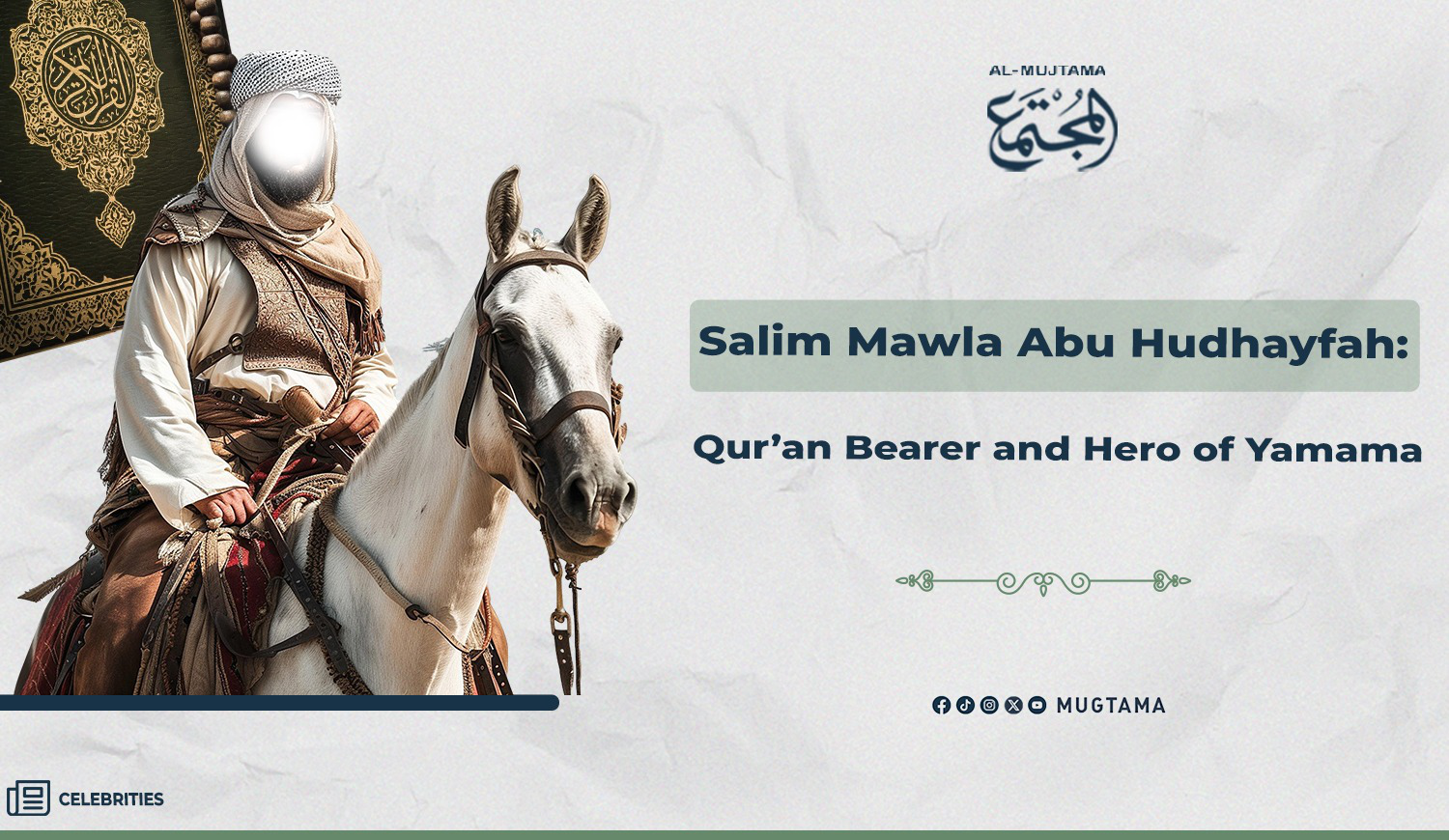Salim Mawla Abu Hudhayfah: Qur’an Bearer and Hero of Yamama

Allah says, “And how many a prophet [fought and] with him fought many religious scholars. But they never lost assurance due to what afflicted them in the cause of Allah, nor did they weaken or submit. And Allah loves the steadfast.” (Aal Imran 3:146) This was the last verse Salim, the freed slave of Abu Hudhayfah (may Allah be pleased with him), recited before attaining martyrdom at the Battle of Yamama, known as the “Battle of the Qur’an Reciters.” This verse perfectly describes the qualities of the devout: no weakness (strong resolve), no despair, no surrender to the enemy, and steadfast patience.
Who Are the Rabbaniyyoon?
The Rabbaniyyoon are ‘Men of
Allah’ who are intensely devoted to acts of worship and abstain from worldly
temptations. Allah describes them as those who teach the Book and study it: “It is not for a human [prophet] that Allah should give
him the Scripture and authority and prophethood and then he would say to the
people, ‘Be servants to me rather than Allah,’ but instead, [he would say], ‘Be
pious scholars of the Lord because of what you have taught of the Scripture and
because of what you have studied.’” (Aal Imran 3:79)
The Rabbani Yoon are people of
the Qur’an and of jihad. Salim
was one of them — a devout companion, a
master of Qur’anic recitation, and a brave warrior.
Salim, the Freed Slave of Abu Hudhayfah
Salim ibn Ma‘qil, the freed slave
of Abu Hudhayfah. He was one of the earliest honest converts to Islam, a
Muhajir (emigrant to Madinah), a veteran of Badr, one of the closest of the
Qur’an teachers, a learned scholar, and a steadfast warrior.
Salim’s origin was Persian. He
was once a slave, freed by the wife of Abu Hudhayfah ibn ‘Utbah. Abu Hudhayfah
adopted him, but after adoption was prohibited in Islam, he remained as his
freed slave (mawla). Hence, he became known as Salim Mawla Abu Hudhayfah.
He rose to prominence among the
Qur’an reciters of the Companions. In Sahih al-Bukhari, the Prophet ﷺ said: “Take
(learn) the Qur'an from four: `Abdullah bin Masud, Salim, Mu`adh and Ubai bin
Ka`b.” Ibn ‘Umar (may Allah be pleased with them both) also narrated:
“Salim, the freed slave of Abu Hudhayfah, used to lead the first emigrants
and Companions of the Prophet ﷺ in prayer at Quba Mosque, among them Abu
Bakr and Umar.” It is mentioned in a narration “because he was
the most proficient in Qur’anic recitation.”
The Prophet (peace be upon him) Praises His Recitation
In Musnad Ahmad, A’ishah
(may Allah be pleased with her) said: “One night
the Messenger of Allah ﷺ saw I was late one night, so he asked me, ‘What kept you?’ I
replied, ‘In the mosque is the most beautiful voice I have ever heard reciting
the Qur’an.’ He took his cloak, went out to listen, and found it was Salim the
freed slave of Abu Hudhayfah. He said, ‘All praise is due to Allah who has
placed in my Ummah one like you.’”
This freed slave, may Allah be
pleased with him, had risen to be an imam and a leader among the elite of the
Companions — all due to his commitment to the Qur’an in learning, teaching, and
living by it. ‘Uthmān reported God’s messenger as saying, “The best among you is he who learns and teaches the
Qur’ān.”
Battle of Yamama
The Battle of Yamama saw the
participation of many Qur’an reciters, and a large number of them were
martyred. Ibn al-Musayyib reported that among the 500 martyrs were 30–50 Qur’an
bearers. When the battle intensified, the Muslims nearly faltered, but the
Huffaz (Quran memorizers) — led by Salim — stood firm, becoming one of the
major reasons for victory. After the martyrdom of Zayd ibn al-Khattab (the
bearer of the Muhajirun banner),
Salim took the banner. The Muslims feared a breach from his position, but he
replied: “What a wretched Qur’an bearer I would be if you were attacked from
my side.”
A Legacy of Steadfast Faith
Ibn al-Mubarak narrated from
Hanzala ibn Abi Sufyan that on that day Salim (Abu Hudhayfah’s freed slave) was
asked in the line of battle whether he would hold the banner of jihad. Someone
asked him: “Are you afraid for yourself, that you will turn the banner to
another?” He replied: “What a wretched Qur’an-bearer I would be then.”
At that moment his right hand was cut off; he took the banner in his left, and
then his left was cut off. He then embraced the banner to his chest while
reciting the ayahs: “Muhammad is not but a
messenger. [Other] messengers have passed on before him. So if he was to die or
be killed, would you turn back on your heels [to unbelief]? And he who turns
back on his heels will never harm Allah at all; but Allah will reward the
grateful. And it is not [possible] for one to die except by permission of Allah
at a decree determined. And whoever desires the reward of this world - We will
give him thereof; and whoever desires the reward of the Hereafter - We will
give him thereof. And we will reward the grateful. And how many a prophet [fought and] with him fought many
religious scholars. But they never lost assurance due to what afflicted them in
the cause of Allah, nor did they weaken or submit. And Allah loves the
steadfast.” (Aal-Imran 3:144–146)
When he was struck down, he asked
his companions: “What happened to Abu Hudhayfah?” He was told: “Killed.”
He asked about another named man; he was told: “Killed.” Salim then
said: “Lay me down between them.”
His patron Abu Hudhayfah had been
calling to the people of the Qur’an, urging them: “O people of the Qur’an,
adorn the Qur’an with deeds!” He too was martyred. After the battle ended
Salim and Abu Hudhayfah were found together, slain: the head of one near the
feet of the other.
Esteemed by the Companions
Salim’s standing in the hearts of the leading Companions was
enormous. Malik reported that Umar ibnal-Khattab would praise him heavily saying: “If Salim was alive I
would not have made [the caliphate] a matter of consultation.” In another
narration Umar said that if he had to entrust authority to one of two men, he
would rely on Salim Mawla Abu Hudhayfah and Abu Ubaydah ibn al-Jarrah.
Lessons for Today
After the recent “Al-Aqsa Flood”
operation, we are in dire need of revisiting the stories of the Prophet’s
battles and the Companions’ bravery to draw duties and priorities. Just as
Yamama was fought by the elite Huffaz of the Companions, Al-Aqsa Flood saw the elite
Huffaz of Gaza in the front lines.
One of Yamama’s results was the
preservation of the religion, the suppression of the apostasy, and the
gathering and safeguarding of the Qur’an. Imam Ahmad recorded Zayd ibn Thabit
saying that Umar went to Abu Bakr and said, “Casualties were heavy among the
Muslims who knew the Qur'an by heart, Salim (Mawla Abu Hudhayfah) has been
killed, and I am afraid that more heavy casualties may take place among the
Muslims on other battlefields. So collect the Qur’an in one place, for I fear
it may be lost.” Abu Bakr accepted this and appointed Zayd ibn Thabit to
collect the Qur’an.
The Al-Aqsa Flood’s results
included rallying Muslims around the cause of the Prophet’s Masra (Al-Aqsa),
reviving that cause, freeing many captives, re-energizing jihad in the Ummah,
and shattering the enemy’s prestige.
A Call to Action
Educators should prioritize Qur’aneducation, reflection, and application in all programs. Qur’an
memorization projects should be named after the elite Huffaz, linking today’s
youth to the heroic sacrifices of Gaza’s Qur’an bearers of mujahideen. The
Prophet’s teaching method was clear, Abu ‘Abd al-Rahman al-Sulami said: “We
learned the Qur’an from people who, when they learned ten verses, did not move
to the next until they had understood and applied them. Therefore, we learned
and applied simultaneously.”
Ibn Majah narrated from Jundub
al-Bajali, “We were with the Prophet ﷺ as young men. We learned faith before we
learned the Qur’an. Then we learned the Qur’an and it increased us in faith.”
-------------------------------------------------------------
Check Also:
- Legacy of Abu Bakr Al-Siddiq
- Abu Dujanah... The Owner of the Band of Death
- Suhaybal-Rumi... 'The deal is profitable, Abu Yahya.
- Spiritual Benefits of Listening to the Quran











